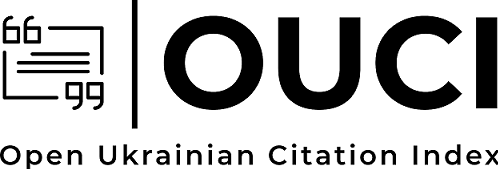RIGHT-BANK NOBILITY IN EDUCATIONAL ENVIRONMENT OF THE RUSSIAN EMPIRE (FIRST THIRD OF 19TH CENTURY)
DOI:
https://doi.org/10.28925/2524-0757.2016.1.14Keywords:
Russian Empire, third section of Rzeczpospolita, Right-bank Ukraine, Adam Czartoryski, Tadeusz Czacki, education, nobilityAbstract
The historical destiny of the Right-bank nobility after the entry of the Prydnieprivshcina into the Russian Empire in the issue of third partition of Rzeczpospolita (Polish–Lithuanian Commonwealth) (1795) was the scholar’s interest since the 19th century. However, the comprehensive special study of noble education in Right-bank provinces at the end of 18th — first third of 19th century in the native historical science is absent, although some aspects of this problem were enlightened in the middle of the 19th century, in particular in the form of diaries, memoirs, print statistical data and analytical articles that accompanied them. Researchers of nobility in modern Ukrainian historiography I. Krivoshey and Ir. Krivoshey defined in their publications the directions of Russian policy towards the Right-bank nobility and illustrated them with examples from the lives of Uman nobles. Directly, the issues of education gentry on the Right-bank Ukraine after the uprising of 1830–1831 were studied by I. Blyzniuk in his publications. Among valuable historiographical fi ndings it should be mentioned the articles by V. Balusko, Yu. Voitenko, Yu. Nikolenko, I. Fizik, I. Yarmorishyk, etc. To study the educational process in Rzecz Pospolita, there was also used a thorough work by L. Zashkilniak and, of course, a number of books by D. Beauvois, a French scholarslavinist. A well-known researcher enlightens the process of gradual reduction of noble education at the Right-bank Ukraine in the first half of 19th century under the pressure of Imperial administration and the state of noble education after the November uprising (1830–1831). However, the educational process in general and the participation of the Right-bank nobility in it and magnates, in particular, require further thorough study with the involvement of a broad resource and historiography base, because there has been practically no works in the Soviet historical science on this problem. Even in the period of Ukrainian independence the native science has got still many issues that require proper study: for example, special attention should be given to the main directions of tsarist policy in the field of education, aimed at the integration of the Right-bank Ukraine into Imperial cultural environment and russification / evolutional depolarization of attached after the third partition of Rzeczpospolita (1795) Ukrainian provinces in the first third of the 19th century, mainly in the reign of Oleksandr I. At the end of 18th — first third of 19th century the noble network of educational communications at the territory of the Right-bank Ukraine was entirely Polish, and was presented by educational institutions of two types: spiritual and secular, which, in their turn, were divided into public and private. Russian policy in the field of education in Right-bank Ukraine in the first third of the 19th century affirms the eff orts of the authorities on integration of the schools system elements of the Rzeczpospolita and absence of interferance in this area until a definite time. Polish was the language of educational institutions, where the sons of local nobility were educated, legal proceedings, official institutions, and various political organizations. Primary and secondary education (monastic schools, private pensions and county gymnasia) were the base for foundation of education, Polish patriotism and Russophobia. Continuation of study at the Kremenets Lyceum, as well as at the Richelieu Lyceum in Odessa and Wilno University, but to a less extent, and then at the Kyiv University of St. Volodymyr, indicates about the fact that the ruling class (the nobility) of Right-bank Ukraine successfully took advantage of the hegemony in the field of education. Despite the all activities of the Russian tsarism, closing and reduction of noble Polish educational institutions, the all-encompassing russification of education in the first third of the 19th century was not successful. Main contribution in this regard belongs to A. Czartoryskyi, who was a curator of the "school" in "Polish" provinces of the Russian Empire in 1803–1824 and had a relative discretion in educational administration. As a result, the Polish University in Wilno and the lyceum in Kremenets kept and spread Polish culture among the younger generation. Thereafter, many Polish patriots lived in the region, who became members of various underground organizations and societies, such as the Department of the Society of United Slavs (1823) and the Southern Society (1821). Since 1831 education in all Polish schools was transfered into the Russian language of training, and the base of spiritual depolonization program of South-Western region started the reduction and limitation of Catholic and Uniate churches’ influence.
Downloads
References
Balushok V. Poliaky ukrainskoho Pravoberezhzhia: do problemy asymiliatsii [Elektronnyi resurs] / Vasyl Balushok. — Rezhym dostupu : mue.etnolog.org.ua/zmist/2009/187.pdf. — S. 187–192.
Blyzniuk I.V. Osvita polskoi shliakhty v pershii polovyni ХІХ st. / I.V. Blyzniuk // Natsionalni menshyny Pravoberezhnoi Ukrainy: istoriia i suchasnist : naukovyi zbirnyk. Seriia “Pratsi Zhytomyrskoho naukovokraieznavchoho tovarystva doslidnykiv Volyni”. T. 18 / vidp. red. M.Yu. Kostrytsia. — Zhytomyr : Volyn, 1998. — S. 121–123.
Blyzniuk I.V. Shliakhetska osvita na Pravoberezhnii Ukraini v kintsi XVIII — na pochatku ХІХ st.: Publichni shkoly pry bazyliianskykh monastyriakh / I.V. Blyzniuk // Humanitarni nauky: problemy, poshuky, perspektyvy. Zbirnyk naukovykh prats. Ch. VI / redkol.: V.H. Kuz (holov. red.) ta in. — K. : Znannia, 2000. — S. 14–23.
Bovua D. Bytva za zemliu v Ukraini 1863–1914 rr.: Poliaky v sotsio-etnichnykh konfl iktakh / D. Bovua ; per. na ukr. Zoi Borysiuk. — K. : Krytyka, 1998. — 334 s.
Bovua D. Hordyev uzel Rossyiskoi ymperyy: Vlast, shliakhta y narod na Pravoberezhnoi Ukrayne (1793–1914) / D. Bovua ; аvtoryz. per. s fr. Maryy Krysan. — M. : Novoe lyteraturnoe obozrenye, 2011. — 1008 s.
Bovua D. Rosiiska vlada i polska shliakhta v Ukraini 1793–1830 rr. / D. Bovua ; per. z fr. Zoi Borysiuk. — L. : Kalvariia, 2007. — 296 s.
Voitenko Yu.M. Elita Pravoberezhnoi Ukrainy v rosiiskomu imperskomu suspilstvi: politykosotsialni vymiry (1793–1832 rr.) : avtoref. dys. … kand. ist. nauk : spets. 07.00.01 «Istoriia Ukrainy» / Yu.M. Voitenko. — 21 s.
Dolbylov M. Zapadnye okrayny Rossyiskoi ymperyy / M. Dolbylov, A. Myller. — M. : Novoe lyteraturnoe obozrenye, 2006. — 608 s.
Zashkilniak L.O. Istoriia Polshchi: Vid naidavnishykh chasiv do nashykh dniv / Leonid Opanasovych Zashkilniak, Mykola Hryhorovych Krykun. — L. : Lvivskyi natsionalnyi universytet imeni Ivana Franka, 2002. — 752 s.
Kryvosheia I. Rosiiske zakonodavstvo pro shliakhetstvo Pravoberezhnoi Ukrainy (kinets XVIII — persha polovyna ХІХ st.) / I. Kryvosheia, Ir. Kryvosheia // Sanhushkivski chytannia. Zbirnyk naukovykh prats I Vseukrainskoi naukovoi konferentsii (24–25 sichnia 2003 r., m. Slavuta) / redkol.: V.H. Berkovskyi (holova), Yu.M. Panyshko (vidp. red.) ta in. — L., 2004. — S. 161–166.
Kryvosheia I.I. Umanshchyna v etnopolitychnii istorii Ukrainy (kinets XVIII — persha tretyna XIX st.) / I.I. Kryvosheia, V.V. Kryvosheia, I.I. Blyzniuk. — K. : IPiED NANU, 1998. — 81 s.
Kryvosheia I.I. Umanskyy vasylianskyy monastyr (1765–1834) / I.I. Kryvosheya. — Uman : PP Zhovtyy, 2009. — 28 s.
Nikolenko Yu.D. Polityka rosiiskoho tsaryzmu v haluzi osvity shliakhetstva Pravoberezhnoi Ukrainy v pershii tretyni ХІХ st. [Elektronnyi resurs] / Yu.D. Nikolenko. — S. 26–35. — Rezhym dostupu : http://shron.chtyvo.org.ua/Nikolenko_Yurii/Polityka_rosiiskoho_tsaryzmu_v_haluzi_osvity_shliakhetstva_Pravoberezhnoi_Ukrainy_v_pershii_tretyni_XIX_st.pdf
Rozvytok osvity i nauky v Ukraini u 19 st. [Elektronnyi resurs]. — Rezhym dostupu : http://studopedia.org/7-10703.html
Fytsyk I.D. «Patriotychna svidomist» shliakhty Pravoberezhnoi Ukrainy / I.D. Fytsyk [Elektronnyi resurs] // Hileia: naukovyi visnyk. — 2013. — № 78. — S. 25–29. — Rezhym dostupu : http://nbuv.gov.ua/j-pdf/gileya_2013_78_9.pdf
Iarmoshyk I.I. Polska istoriohrafi ia 1800–1939 rr. suspilno-politychnoho i kulturno-dukhovnoho rozvytku Volyni : avtoref. dys. … d-ra ist. nauk : spets. 07.00.01 «Istoriia Ukrainy» / Ivan Ivanovych Yarmoshyk. — 47 s.
Published
How to Cite
Issue
Section
License
Copyright (c) 2016 Kyiv Historical Studies

This work is licensed under a Creative Commons Attribution-NonCommercial-ShareAlike 4.0 International License.
Authors who publish in this journal retain the right of authorship of the work and give to the journal right of first publication of this work under the conditions of Creative Commons: Attribution-NonCommercial-ShareAlike 4.0 International (CC BY-NC-SA 4.0), which allows others freely distribute the work published with reference to the authors of the original work and the first publication of this magazine.














